Which Computer Degree is Right For Me?
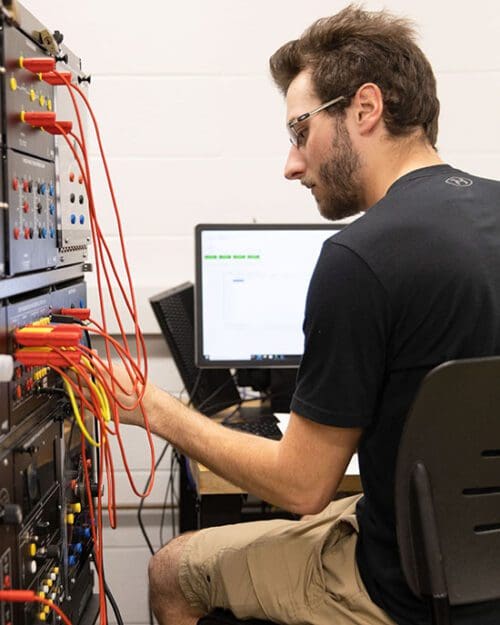
Computers are everywhere. Whether it is a laptop, cell phone, or public devices like an ATM or cash register, we need computers to accomplish daily tasks.
But what does it mean to pursue a career in a computer-related field? Purdue University Northwest (PNW) has several computer undergraduate majors that allow you to explore your interests while reaching your future career goals. From degree highlights, outcomes and careers, we’ve got the answers and programs you’re searching for!
All of PNW’s computer degrees offer valuable hands-on experience and project-based coursework to prepare graduates for in-demand, high-paying careers.
See all of PNW’s computer-based programs
Core Computer Degrees at PNW
Computer Engineering
Are you interested in working with computer hardware and software to design and improve products, services and infrastructure?
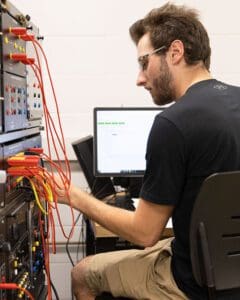
All the technology you encounter, from computers and cell phones to electric/hybrid vehicles, robotics and medical devices, require hardware, software and algorithms to complete their intended functions.
Computer engineering focuses on the creation of the hardware, software and algorithms that network the world via tangible products connected to the virtual spaces of the internet and virtual reality.
As a Computer Engineering student, you’ll apply mathematics, physics and programming skills to design and develop solutions for hardware and software systems. You will gain and expand your skills from courses such as software engineering, artificial intelligence and machine learning. As a Computer Engineering student, you can expect to spend less time learning computational theories than students concentrating in more math-intensive Computer Science.
STUDY COMPUTER ENGINEERING AT PNW
Common Careers
- Computer or hardware engineer
- Computer programmer
- Software engineer
- Network systems engineer
- Game developer
Projected Growth
Computer engineering occupations have a 5% projected growth through 2031, according to the U.S. Bureau of Labor Statistics.
Computer Graphics Technology
Are you interested in understanding how someone can click, scroll and navigate through a web page or application?
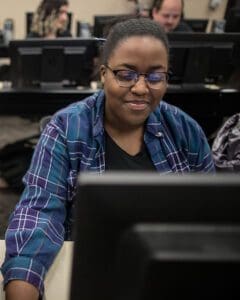
Build your skills in understanding and designing user experience with our computer graphics technology degree!
As a Computer Graphics Technology student, you’ll learn how to use sketching, 2D and 3D modeling, animation, user interface design and more to work in front-end development, or the programming and design of the interface users interact with on a web page or application. Unlike Computer Engineering and Computer Science students who are expected to rely more on mathematics or physics, Computer Graphics Technology students have lots of opportunities for creative work and are interested in improving the user-friendliness of an application.
The Computer Graphics Technology degree prepares you for industrial careers in the design and management of digital products, services, applications, data visualization, animation modeling and game design.
Study Computer Graphics Technology at PNW
Common Careers
- User experience (UX) designer
- Digital animator or illustrator
- Web developer
- Game designer or developer
- Graphic or multimedia designer
Projected Growth
Computer graphics technology occupations have a 3% projected growth through 2031, according to the U.S. Bureau of Labor Statistics.
Computer Information Technology
Do you like working with computers and data while solving complex technical problems?
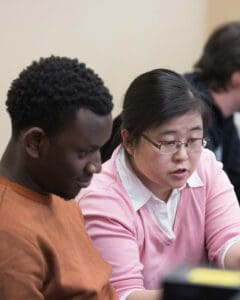 A Computer Information Technology degree will help you apply programming and problem-solving skills to application development, operating system management and more.
A Computer Information Technology degree will help you apply programming and problem-solving skills to application development, operating system management and more.
As a student on this path of study, you’ll earn plenty of hands-on experience and practical work examples to understand back-end development, or the behind-the-scenes architecture that makes apps and services work. You can expect to gain skills in algorithm and database design and implementation. Our faculty also teach courses on topics such as artificial intelligence (AI) and cloud computing which can help you expand your skills.
You will also take classes that focus on understanding security implementation for systems, which is expanded upon even more in the Cybersecurity path of study.
Study Computer Information Technology at PNW
Common Careers
- Software developer
- Cybersecurity expert
- Information technology manager
- Network administrator
- Web developer
Projected Growth
Computer information technology occupations have a 15% projected growth through 2031, according to the U.S. Bureau of Labor Statistics.
Computer Science
Do you like studying computers and computational systems and working on software-driven solutions for real-world problems?

Computer Science is the path for you! Computer Science focuses on understanding the theory of computation to design algorithms that solve mathematical questions that inform the modern processes of computing.
As a Computer Science student, you will deepen your understanding of programming and algorithms to build and navigate the data that computers use for information. This core knowledge will give you the tools to create and enhance software through hands-on projects and experiences in computer architecture, as well as operating system and database design. Some examples include home automation, object detection for vehicles’ auto-pilot modes and facial recognition or detection on devices.
A degree in computer science will provide you with the foundational knowledge for a career in the computing and technology industries. That knowledge will also help you create applications that benefit other disciplines, such as life sciences and business.
Common Careers
- Computer scientist
- Software engineer
- Data scientist
Projected Growth
Computer science occupations have a 21% projected growth through 2031, according to the U.S. Bureau of Labor Statistics.
Cybersecurity
Are you interested in protecting computer systems and data?

Cybersecurity is a fast-growing area of study that equips students with the skills to protect computers and their networks from criminal or unauthorized access.
As a Cybersecurity student, you will first learn about operating systems, networks and databases. While some of these topics overlap with the Computer Information Technology program, Cybersecurity students continue to deepen their understanding of assessing vulnerabilities, threats and risks to computers and their systems through more in-depth coursework.
Your courses will prepare you to work in a variety of careers all with the goal of protecting users and sensitive data. You can also add to your studies by earning additional certificates, such as the Certified Ethical Hacker certification.
PNW’s Center for Cybersecurity allows students to conduct research, learn and develop career skills through a designation as a National Center of Academic Excellence in Cyber Defense Education.
PNW’s Center for Cybersecurity Research
Common Careers
- Cybersecurity expert
- Security analyst
- Information technology security analyst
- Digital forensic examiner
Projected Growth
Cybersecurity occupations have a 35% projected growth through 2031, according to the U.S. Bureau of Labor Statistics.
Electrical Engineering
Are you curious about what powers computers and other devices? Are you interested in designing and developing solutions for computer-based systems?
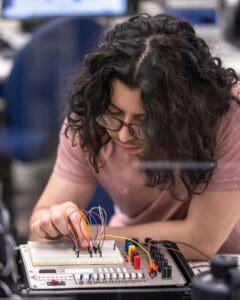 Electrical Engineering focuses on the design and development of electrical/electronic systems using computer software, hardware and programming. Electrical engineering students are prepared to apply scientific knowledge to real-world applications including the hardware and interfaces that give computers life.
Electrical Engineering focuses on the design and development of electrical/electronic systems using computer software, hardware and programming. Electrical engineering students are prepared to apply scientific knowledge to real-world applications including the hardware and interfaces that give computers life.
As an Electrical Engineering student, you will apply mathematics, physics, or programming skills to develop engineering solutions. You will also gain the skills from the required computer engineering courses while expanding your knowledge in advanced topics like artificial intelligence and machine learning.
This path of study fosters the ability to work with a range of electrically powered devices, from personal electronics to large-scale systems like power grids and factories.
Study Electrical Engineering at PNW
Common Careers
- Electrical engineer
- Electronics engineer
- Hardware engineer
- Software engineer
- Control system engineer
Projected Growth
Electrical engineering occupations have a 3% projected growth through 2031, according to the U.S. Bureau of Labor Statistics.
Computer Degree Common Terms
Computer programming is the ability to write code so that applications and software know how to perform. There are several languages that programmers can learn, such as Java, C++ and Python. Students in a computer-based degree program will have to learn at least one programming language.
Hardware includes any of the physical pieces computing devices use or the material it is housed in. Any device, from a personal computer to a video game console, has external and internal hardware that allows you to complete functions like output, input, communication and processing. External hardware devices include monitors and keyboards while internal hardware includes hard drives and RAM.
Software is a set of instructions that computers use to complete tasks. There are different categories of software and it is a widespread term that refers to applications, scripts and programs that a device uses.
An algorithm is a set of instructions that solve a problem or complete a task in a finite number of steps. Algorithms, along with data structures, are fundamental building blocks of computer programs. Computer code, math equations and recipes are all examples of commonly used algorithms.
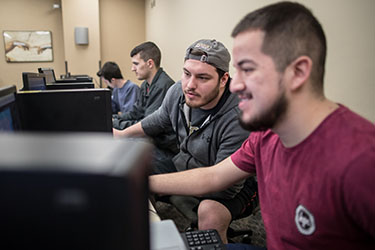
Computer Degrees At PNW
PNW offers a variety of undergraduate and graduate computer-based programs. Whether you are looking to major, minor or receive a certificate, there is a program for you!